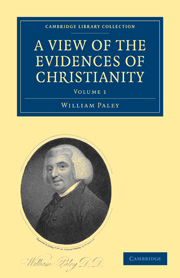Book contents
- Frontmatter
- HONOURABLE AND RIGHT REVEREN
- PREPARATORY CONSIDERATIONS
- PART I OF THE DIRECT HISTORICAL EVIDENCE OF CHRISTIANITY, AND WHEREIN IT IS DISTINGUISHED FROM THE EVIDENCE ALLEGED FOR OTHER MIRACLES
- CHAPTER I
- CHAPTER II
- CHAPTER III
- CHAPTER IV
- CHAPTER V
- CHAPTER VI
- CHAPTER VII
- CHAPTER VIII
- CHAPTER IX
- SECTION I
- SECTION II
- SECTION III
- SECTION IV
- SECTION V
- SECTION VI
- SECTION VII
- SECTION VIII
- SECTION IX
- SECTION X
- SECTION XI
- CHAPTER X
- CHAPTER I
- Frontmatter
- HONOURABLE AND RIGHT REVEREN
- PREPARATORY CONSIDERATIONS
- PART I OF THE DIRECT HISTORICAL EVIDENCE OF CHRISTIANITY, AND WHEREIN IT IS DISTINGUISHED FROM THE EVIDENCE ALLEGED FOR OTHER MIRACLES
- CHAPTER I
- CHAPTER II
- CHAPTER III
- CHAPTER IV
- CHAPTER V
- CHAPTER VI
- CHAPTER VII
- CHAPTER VIII
- CHAPTER IX
- SECTION I
- SECTION II
- SECTION III
- SECTION IV
- SECTION V
- SECTION VI
- SECTION VII
- SECTION VIII
- SECTION IX
- SECTION X
- SECTION XI
- CHAPTER X
- CHAPTER I
Summary
The four Gospels, the Acts of the Apostles, thirteen Epistles of Saint Paul, the First Epistle of John, and the First of Peter, were received without doubt by those who doubted concerning the other books which are included in our present Canon.
I state this proposition, because, if made out, it shows that the authenticity of their books was a subject amongst the early Christians of consideration and inquiry; and that, where there was cause of doubt, they did doubt; a circumstance which strengthens very much their testimony to such books as were received by them with full acquiescence.
I. Jerome, in his account of Caius, who was probably a presbyter of Rome, and who flourished near the year 200, records of him, that, reckoning up only thirteen epistles of Paul, he says the fourteenth, which is inscribed to the Hebrews, is not his: and then Jerome adds, “With the Romans to this day it is not looked upon as Paul's.” This agrees in the main with the account given by Eusebius of the same ancient author and his work; except that Eusebius delivers his own remark in more guarded terms: “And indeed to this very time by some of the Romans, this epistle is not thought to be the apostle's.”
[…]
- Type
- Chapter
- Information
- A View of the Evidences of ChristianityIn Three Parts, pp. 269 - 276Publisher: Cambridge University PressPrint publication year: 2009First published in: 1794

